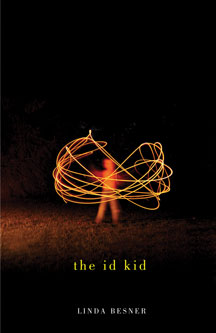 Micheline Maylor
Micheline Maylor
a review of
the id kid
by Linda Besner
Signal Editions – Vehicule Press
ISBN 978-1-55065-313-7
$18.00
A quick googling of Linda Besner reveals a clown-nose portrait, the poet reading on an excavator, and an interview with Zach Wells that starts with bed-bugs and develops into a discussion of diction and sound. This girl is different. This girl isn’t taking herself too seriously. In her debut collection, the id kid, her poems play with language skillfully.
In fact, it is easy to lump her in with poets adept in linguistic gymnastics, such as Ken Babstock, Christian Bök, and Zach Wells. But these fellas are veterans. Besner stands out because a) this is her debut collection. It seems, she’s just arrived. This is not an awkward first book where we need to patiently wait with the author as she develops her skills as a poet. They are already present, accounted for and strong. And b) The collection doesn’t drift into the incomprehensible. She retains her footing in solid narrative while she does what poets should do, plays with the language and connects emotively with the reader. Take this example from “Knick Knack”:
Mismatch.
Gimcrack gewgaws
culled from every claptrap souk in the Near East.
The bric-a-brac cabinet stacked with lowly crackerjack prizes,
that plastic horse you loved – remember?
– still ticking fitfully on its rockers. (23)
Alliteration and assonance hum the poem along as if it is a song, reminiscent of the Knick-Knack-patty-whack nursery rhyme. It fully embraces the frolic in Besner’s voice, yet the poems never wallow in frivolity. Besner tinkers, too, with concepts brought forward from the theatre of the absurd and explores irony to its fullest effect in “Joke”.
So there’s this beautiful paraplegic girl sitting in a wheelchair
by the sea. My uncles rolled her there, parading past the Orange-
You-Glad julep stand where the knock-knock schmoes hawk
bananas, rake flat the ashtray sand. I’ve never been hugged,she recites. Player piano a dusty tinkle in her throat.
First pass, but the porpoises, those smooth bastards,
are already stifling their snorting in the spray.
Uncle Sid, who cleaned up in last week’s sunburnsweepstakes wearing a clown nose instead of a gilligan’s hat,
leans in to his brother, murmurs, Listen Charlie, the one-liner
is not where the money is. Remember, ha-ha makes ‘has.’ C.O.D.
Harry nods – he’s tops in the desert’s laissez-faire pyramid scheme. (29)
The text is chock-a-block with punchy quips and imagery. It pushes us, the readers, to reconceptualize meaning and narrative through the use of flexible syntax. We are challenged to think beyond the first and most literal interpretation. In this way, the poet best showcases her skills. The subtext exists and can be deciphered because we are inspired to do so.
“Matthew J. Trafford” is another example of the poet’s skill. This poem is a joy to read in the way a new favourite song is set on replay. I had a desire to return to the text repeatedly to observe the stunning word manipulation. Besner dabbles with palindromic effect, with diction, to remind us that identity is a shifty business despite how we try to label ourselves.
When I came back you’d written YAG on your forehead
with my eyeliner; you were sitting on a loots
by the hallway mirror.In was the year we devil together in Zizkov.
We’d hung my blue prat across the moor
To separate your bed and desk from the salon. (46)
The context of the wording is slippery and it becomes a game to return and discover new interpretations within the lines. The descriptive language allows ‘the best words in the best order’ to become ‘the right words in the wrong order’. The poem becomes more delectable for doing so. Distortion becomes a way to increase and imply meaning within the poems. These are not ‘one reading’ poems, subsequent readings always harvest more electricity.
Besner’s themes in the id kid are ironic and sharp edged, full of irony and wit. She’s produced a syntactically scintillating collection of poems well worth the deviation.
Linda Besner is a graduate of the UBC MFA program and lives in Toronto.
This review appears in FreeFall Volume XX Number 1 Spring / Summer 2010.

